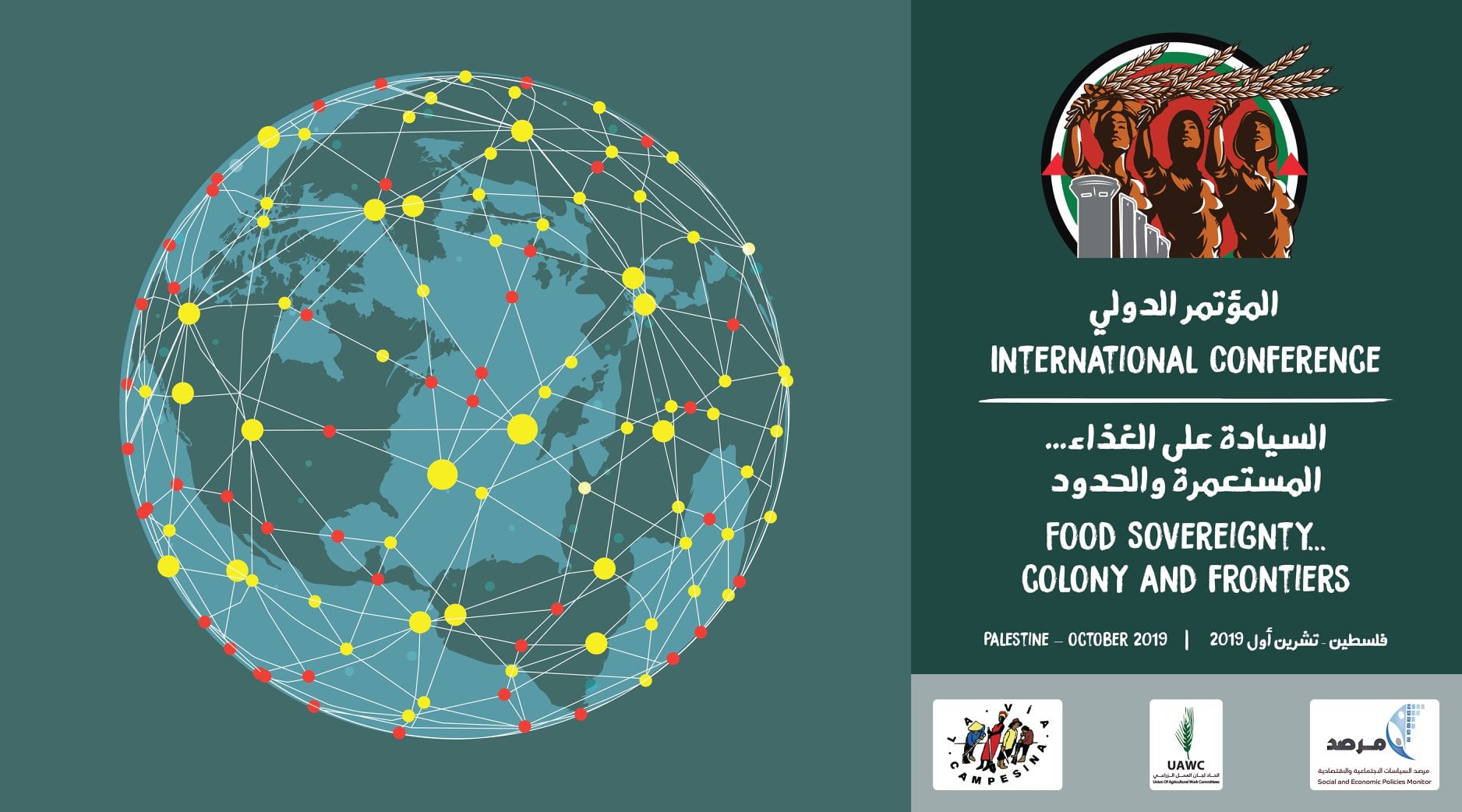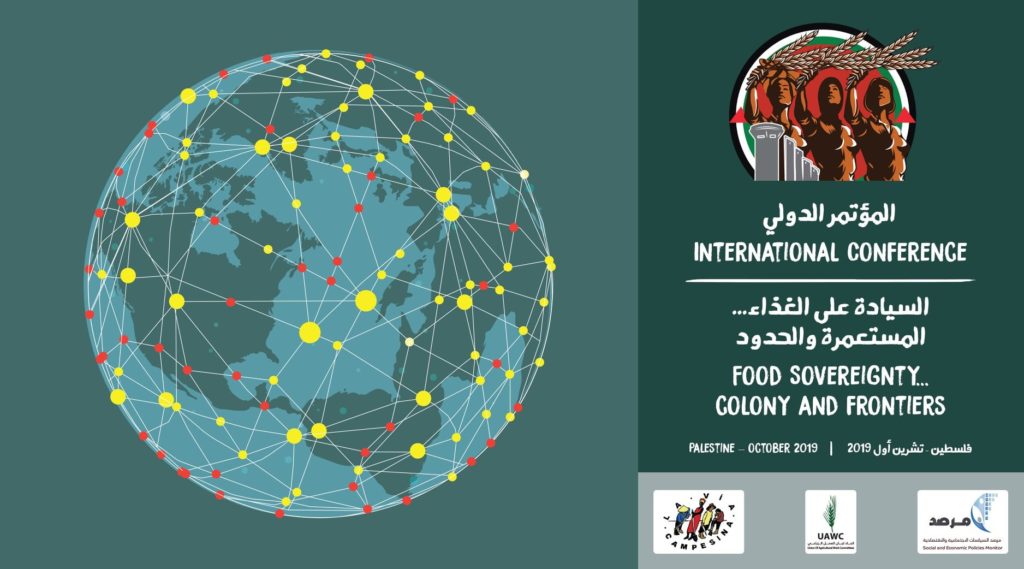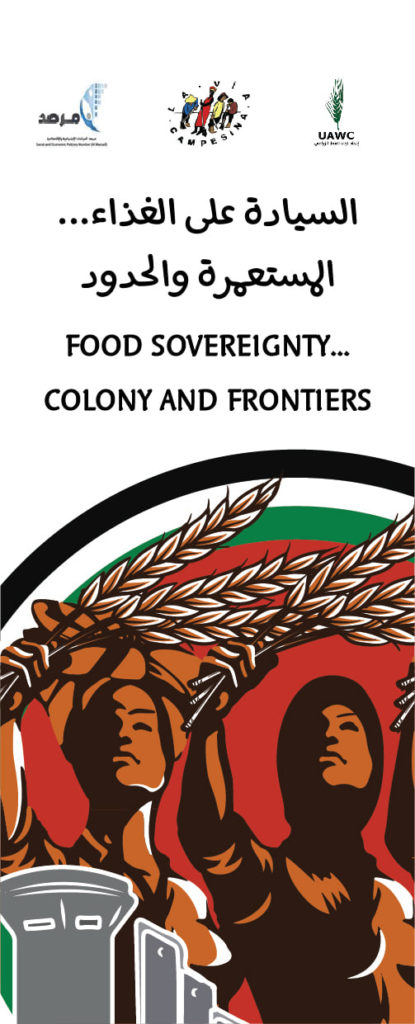Palestinian peasants celebrate the International Day of Action for People’s Food Sovereignty and Against Transnational Corporations

Ramallah, Palestine — Every October 16th, La Via Campesina’s members and allies around the world commemorate the International Day of Action for Peoples’ Food Sovereignty and Against Transnational Corporations. Food sovereignty is the right of the world’s peoples to define and design their own food systems. Introduced by La Via Campesina more than 20 years ago as a clapback to neoliberal policies and the limited concept of food security, food sovereignty ensures that the collective rights over land, territories, water, seeds, livestock and biodiversity are in the hands of those who produce food.

This October 16th, La Via Campesina is part of several initiatives all over the world standing against multinationals with the power of food sovereignty. One such initiative, building up to the International Day of Action was a two day International Conference on “Food sovereignty: Colonies and Frontiers”, which took place from October 14-15, 2019 in Ramallah, Palestine.
The struggle for food sovereignty carries extra weight in Palestine, as Palestinian peasants, artisanal fishers, pastoralists and Indigenous communities are caught between the Israeli occupation on one side and the neoliberal transnational market-driven policies of the Palestinian Authority (PA) on the other. Agroecology by and for Palestinians is seen by many as an escape route from this trap, and a way to achieve real sovereignty over their commons.

Palestine’s Union of Agricultural Working Committees (UAWC) has been at the forefront of struggles for land, water, and seed sovereignty — and from that position, is a leading voice seeking justice for the Palestinian people. The conference was a critical step forward in that direction, with hundreds of participants gathered between the West Bank and Gaza — among them members of social movements, grassroots organizations, academics and other social sectors.
UAWC as an organization emphasizes solidarity over charity and development for the long term over humanitarian relief, as well as the full realization of peasants’ rights. These rights are outlined in the recently adopted Declaration on the Rights of Peasants and Other People Working in Rural Areas by the 73rd session of the United Nations General Assembly. La Via Campesina worked tirelessly for over 17 years to achieve this landmark human rights instrument; now is the time for its promotion and implementation in all corners of the world, including in Palestine.
These political visions translate to real projects on the ground to build up grassroots alternatives in contemporary Palestine.
In the West Bank, UAWC’s farmers plant and save traditional seeds that have been in their communities for generations. In fact, UAWC established the first seed bank in Palestine in the heart of occupied territory. Not only does this address the relentless uprooting of Palestinian trees and crops by Israeli army and settlers and the expansion of Israeli agribusiness, but it also encourages Palestinian youth to stay on their land and pursue rural livelihoods. UAWC complements its work on seeds and food production by organizing communities to secure many public services that are lacking in the Palestinian countryside, such as roads and water, as well as providing practical and political training for their affiliated communities.
And in the Gaza Strip, UAWC’s tight network of fishers challenges the Israeli military’s illegal blockade of the sea. While the Oslo Accords stipulate that Palestinian fishers should maintain access to 20 nautical miles of fishing grounds, small-scale artisanal fishers are routinely shot at for casting their nets beyond just a few nautical miles. Palestinians living in the coastal enclave are shut away from the outside world in what is often referred to as the world’s largest open air prison. The conference was no exception — while Gaza City is just some 80 kilometers away from Ramallah, UAWC’s members there had to join via video conference.
They did so diligently for two days, and were greeted by a symphony of applause after having been disconnected due to the regular power outages that are also part of life under occupation. Many UAWC members in the West Bank have never met their colleagues in Gaza, working together for years in spite of these challenges.
While Gaza City is just some 80 kilometers away from Ramallah, UAWC’s members there had to join the conference via video conference.
“Each year, UAWC works with more than 20,000 Palestinian peasants and fishers. We have been doing so for over 30 years,” explained UAWC’s Director General Fuad Abu Saif.
In 2013, UAWC became an official member movement of La Via Campesina. “Being part of La Via Campesina has been critical in raising our voices as Palestinian peasants and lobbying to defend our rights at a global scale,” he added.
